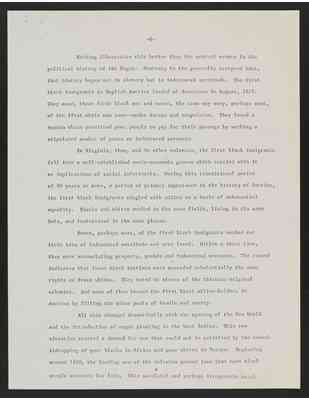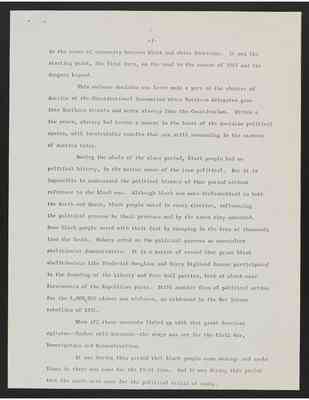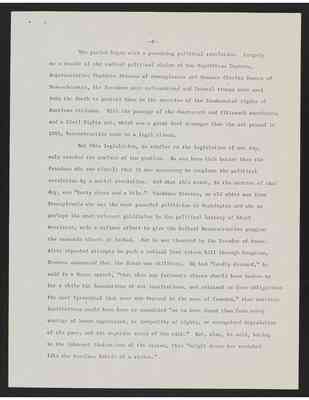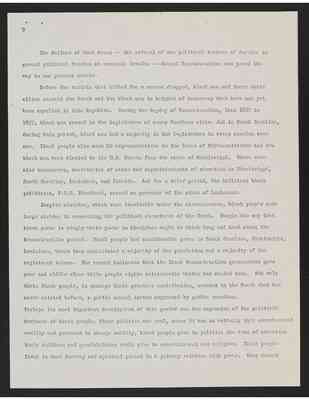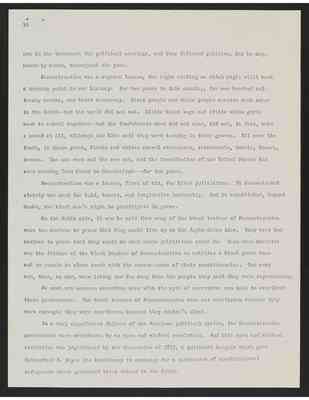Pages
6
-6-
Nothing illustrates this better than the central events in the political history of the Negor. Contrary to the generally accepted idea, that history began not in slavery but in indentured servitude. The first black immigrants in English America landed at Jamestown in August, 1619. They came, these first black men and women, the same way many, perhaps most, of the first white men came--under duress and compulision. They found a system which permitted poor people to pay for their passage by working a stipulated number of years as indentured servants.
In Virginia, then, and in other colonies, the first black immigrants fell into a well=established socio-economic groove which carried with it no implications of racial inferiority, During this transitional period of 40 years or more, a period of primary importance in the history of America, the first black immigrants mingled with whites on a basis of substantial equality. Blacks and whites worked in the same fields, living in the same huts, and fraternized in the same places.
Some, perhaps most, of the first black immigrants worked out their term of indentured servitude and were freed. Within a short time, they were accumulating property, pounds and indentured servants. The record indicates that these black settlers were accorded substantially the same rights as freed whites. They voted in eleven of the thirteen original colonies. And some of them became the first black office-holders in America by filling the minor posts of beadle and surety.
All this changed dramatically with the opening of the New World and the introduction of sugar planting in the West Indies. This new situation created a demand for men that cound not be satisfied by the casual kidnapping of poor blacks in Africa and poor whites in Europe. Beginning around 1660, the leading men of the colonies passed laws that made black people servants for life. This was a fatal and perhaps irreparable break
7
-7-
in the sense of community between black and white Americans. It was the starting point, the first turn, on the road to the summer of 1967 and the dangers beyond.
This ominous decision was later made a part of the charter of America at the Cnstitutional Convention where Northern delegates gave into Southern threats and wrote slavery into the Constitution. Within a few years, slavery had become a cancer in the heart of the American political system, with incalculable results that are still resounding in the streets of America today.
During the whole of the slave period, black people had no political history, in the narrow sense of the term political. But it is impossible to understand to political history of that period without reference to the black man. Although black men were disfranchised in both the North and South, black people voted in every election, influencing the political process by their presence and by the cause they embodied. Some black people voted with their feet by escaping in the tens of thousands from the South. Others acted on the political process as nonviolent abolitionists like Frederick Douglass and Henry Highland Garent participated in the founding of the Liberty and Free Soil parties, both of which were forerunners of the Republican party. Still another form of political action fro the 4,000,000 slaves was violence, as evidenced by the Nat Turner rebellion of 1831.
When all these currents linked up with that great American agitator--Yankee self-interest--the stage was set for the Civil WAr, Emancipation and Reconstruction.
It was during this period that black people came onstage and spoke lines in their own name for the first time. And it was during this period that the seeds were sown for political crisis of today.
8
-8-
The period began with a promising political revolution. Largely as a result of the radical political vision of two Republican leaders, Representative Thaddeus Stevens of Pennsylvania and Senator Charles Sumner of Massachusetts, the freedom were enfranchised and federal troops were sent into the South to protect them in the exercise of the fundamental rights of American citizens. With the passage of the Fourteenth and Fifteenth amendments and a Civil Rights act, which was a great deal stronger than the act passed in 1865, Reconstruction came to a legal climax.
But this legislation, so similar to the legislation of our day, only touched the surface of the problem. No one knew this better than the freedmen who saw clearly that it was necessary to complete the political revolution by a social revolution. And what this meant, in the context of that day, was "Forty Acres and a Mule." Thaddeus Stevens, an old white man from Pennsylvania who was the most powerful politician in Washington and who as perhaps the most relevant politician in the political history of black Americans, made a valiant effort to give the Radical Reconstruction program the economic thrust it lacked. But he was thwarted by the Paradox of Power. After repeated attempts to push a radical land reform bill through Congress, Stevens announced that the dream was stillborn. He had "findly dreamed," he said in a House speech, "that when any fortunate chance should have broken up for a while the foundations of our institutions, and released us from obligations the most tyrannical that ever man imposed in the name of freedom," that American institutions would have been so remodeled "as to have freed them from every vestige of human oppression, or inequality of rights, or recognized degradation of the poor, and the superior caste of the rich." But, alas, he said, bowing to the inherent limitations of the system, this "bright dream has vanished like the baseless fabric of a vision."
9
9
The failure of that dream -- the refusal of the political leaders of America to ground political freedom on economic freedom -- doomed Reconstruction and paved way to our present crisis.
Before the curtain that lifted for a moment dropped, black men their white allies carreid the South and the black man to heights of democracy that have not yet been equalled in this Republic. During the heydey of Reconstruction, from 1867 to 1877, black men served in the legislature of every Southern state. And in South Carolina, during this period, black men had a majority in the legislature in every session save one. Black people also sent 20 representatives to the House of Representives and two black men were elected to the U.S. Senate from the state of Mississippi. There were also treasures, secretaries of state and superintendents of education in Mississippi, South Carolina, Louisianna, and Florida. And for a brief period, the brilliant black politician, P.B.S. Pinchback, served as governor of the state of Louisiana.
Despite mistakes, which were inevitable under the circumstances, black people made large strides in renovating the political structures of the South. People who say that black power is simply white power in blackface ought to think long and hard about the Reconstruction period. Black people had considerable power in South Carolina, Mississippi, Louisiana, where they constitured a majority of the population and a majority of the registered voters. The record indicates that the Black REconstruction governments gave poor and middle class white peopl rights aristocratic whites had denied them. Not only that: Black people, in perhaps their greatest contribution, created in the South what had never existed before, a public school system supported by public taxation.
Perhaps the most important development of this period was the expansion of the political horizons of black people. Since polities was real, since it was an activity that corroborated reality and promised to change reality, black people gave to politics the kind of attention their children and grandchildren would give to entertainment and religion. Black people lived in that faraway and mystical period in a primary relation with power. they turned
10
10
out in the thousands for political meetings, and they followed politics, day by day, month by month, throughout the year.
Reconstruction was a supreme lesson, the right reading on which might still mark a turning point in our history. For ten years in this county, for one hundered and twenty months, men tried democracy. Black people and white people married each other in the South--and the world did not end. Little black boys and little white girls went to school together--and the Confederate dead did not rise, did not, in fact, make a sound at all, although the Klan said they ware turning in their graves. All over the Sluth, in these years, blacks and whites shared streecard, restaurants, hotels, honors, dreams. The sun rose and the sun set, and Constitution of the United States had some meaning from Maine to Mississippi--for ten years.
Reconstruction was a lesson, first all, for black politicans. It demonstrated clearly the need for bold, hones, and imaginative leadership. And it established, beyond doubt, the black man's right to participate in power.
On the debit side, it can be said that many of the black leaders of Reconstruction were to anxious to prove that they could live up to the Anglo-Saxon idea. They were too anxious to prove that they could do what white politicians could do. Even more decisive was the failure of the black leaders of Reconstruction to mobilize a black power base and to remain in close touch with the cotton-roots of their constituencies. Too many men, then, as now, were living too far away from the people they said they were representing.
We need not concern ourselves here with the myth of corruption men used to overthrow these governments. The black leaders of Reconstruction were not overthhrown because they were corrupt; they were overthrown because they couldn't shoot.
In a very significiant failure of the American political system, the Reconstruction governmentss were overthrown by an open and violent revolution. And this open and violent revolution was legitimized by the Compromise of 1877, a political bargain which gave Rutherford B. Hayes the Presidency in exchange for a suspension of constitutional safeguards which protected black voters in the South.
